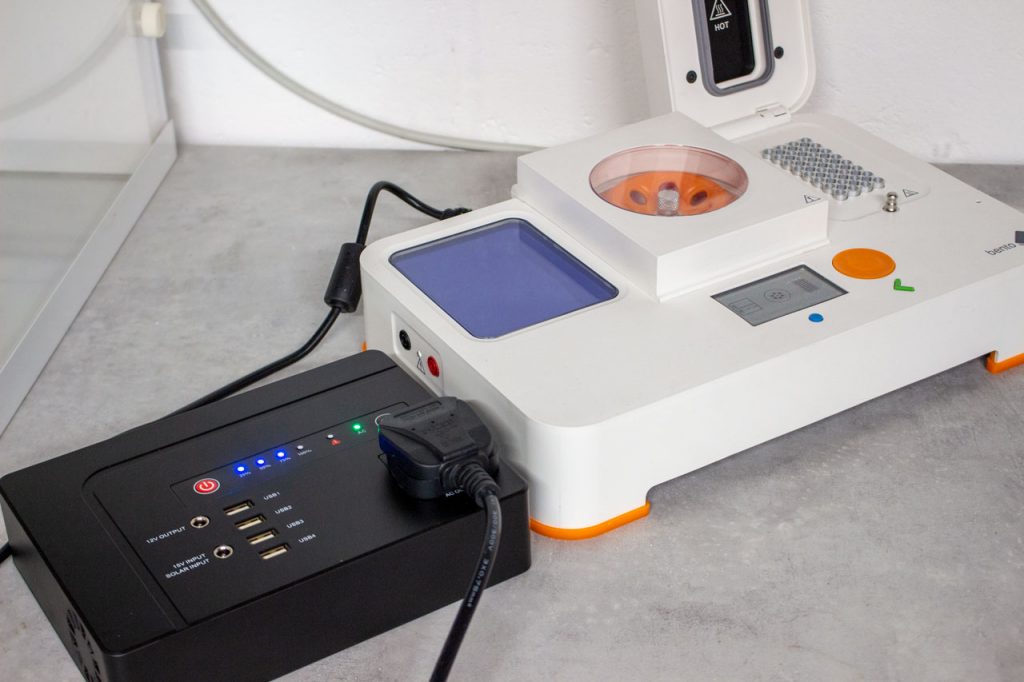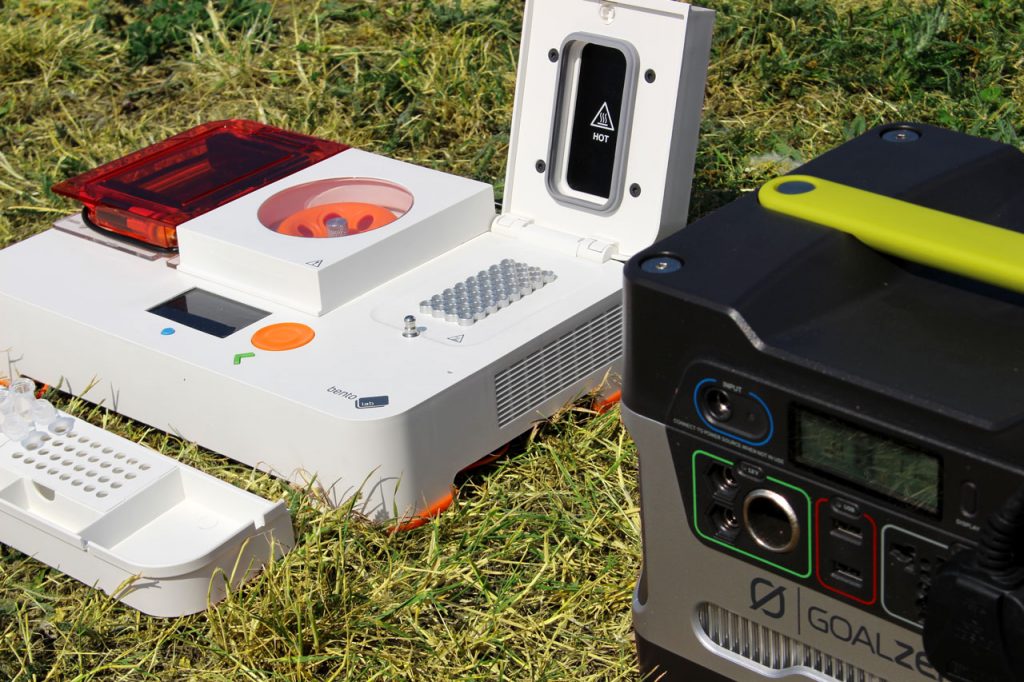Our users are working with Bento Lab in countries across the world, and Bento Lab comes with a universal power supply. The supply works with all international power systems from Japan (100V) to Europe and India (230V). With the right plug, Bento Lab can be plugged into any standard wall socket to run on mains electricity.
However many of our users are working with Bento Lab in unique environments. To make your research truly portable, you need to keep running experiments when power is not guaranteed. We have been testing out a few different setups to explore what’s possible.
What type of battery can I use?
If you are performing research out in the field, Bento Lab can run off a portable power station. There are two requirements for choosing a power station that will be compatible with Bento Lab.
Output / Socket option
Portable power stations are available with a number of different output/plug options: USB (5V), Cigarette Lighter (12V) and AC mains socket (110-240V). To power Bento Lab, you will need a power station with AC mains plug output.
Power rating
Power stations also have different power ratings, which defines how much energy it can supply in a given moment, for each plug output. As you can imagine, charging an iPhone has a very different power requirement to running a centrifuge. Bento Lab draws a maximum power of 140W. If the power rating is less than 140W, the Bento Lab may not function correctly.
So, to recap – you will need a battery with the following features:
- An output with AC mains plug (110V-240V AC)
- A minimum power rating of 140W+
What options are available?
There are a range of power stations available that meet these criteria. When we wrote this article, we tested two options: a plane-friendly power station, the Powkey Power Station and a more powerful solar option, the Yeti 400 Power Station.
- Powkey Portable Power Generator. We bought a Powkey battery from Amazon that had a capacity of 146Wh. It weighs 2kg, and comes in a leather carry bag. You could transport this battery on a plane, because the capacity is within the allowance.
- Yeti Portable Power Station. We tested the Yeti 400 (now replaced by a different model, the Yeti 300). These batteries have large battery capacities and they can be recharged by solar power, or plugging into a car battery. The larger batteries are not suitable for plane transport, so they are a better fit for field trips when you are travelling by car.


How much power do I need?
Each module of Bento Lab uses a different amount of energy, and the PCR block consumes the most energy. If you want to travel on planes, we would recommend an AC power supply with a battery capacity of 100-160 Wh. If you are traveling by car, a battery with more capacity will allow you to run more protocols before needing to charge.
You can calculate the rough amount of energy used for your protocol. Here’s a breakdown of maximum energy consumption for each module over 1 hour.
| Module | Maximum power consumption | Average Energy consumption (60 minutes of use) |
| PCR Thermocycler | 100W (peak 140W) | 20Wh |
| Centrifuge | 15W | 15Wh |
| Transilluminator | 5W | 5Wh |
| Gel electrophoresis | 10W | 10Wh |
To calculate the energy consumed, multiply the fraction of time by the power consumption: 5 min at 30W = 5/60 h x 30W = 2.5 Wh
Try Our Calculator
Try our quick calculator to estimate energy consumption based on your workflow.
Bento Lab Energy Usage Calculator
Enter how many minutes you used each module:
Example Protocol
Here is a scenario based on a protocol from our community.
Scenario: Prepare a Ready-to-sequence Library
In 55 minutes, Dr Sophie Zaaijer prepared a ready-to-sequence library for MinION, using Bento Lab for DNA extraction. Dr Zaaijer and the rest of the team at the New York Genome Center have developed a rapid, inexpensive, and portable strategy to re-identify human DNA called ’MinION sketching’.
DNA Extraction
- Sample incubation at 56˚C for 10 min. Energy: 10 min x 100W = 10/60 x 100 = 16.7Wh
- Sample Centrifugation. Energy: 10 minutes x 15W = 10/60 x 15 = 2.5Wh
Library Prep
- Incubated for 1 min at 30˚C. Energy: 1 min x 100W = 1/60 x 100 = 1.67Wh
- Incubated for 10 min at 30˚C. Energy: 10 min x 100W = 10/60 x 100 = 16.7Wh
Total maximum energy required: 16.7Wh + 2.5Wh + 1.67Wh + 16.7Wh = 37.57Wh
For this protocol, the total maximum energy consumed is 37.57Wh. This protocol could run 3x on the Powkey Station, or 10x on the Yeti 400 Station.
